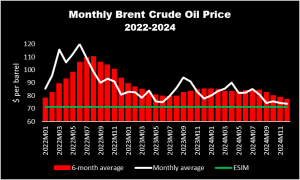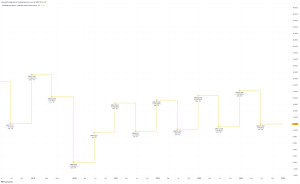Share this page:
There’s been a lot of rubbish investing ‘advice’ coming from the recent meme movement. But among the dirt, you can find some wisdom. One of these nuggets is the idea of ‘diamond hands’. It’s a strategy that could serve you well during a stock market crash.
Here’s everything you need to know about holding onto your investments when you’re facing a drop or a crash.
Paper hands versus diamond hands
‘Paper hands’ refers to folding easily and selling out of your investments too soon. Being quick to sell your stocks, especially during a stock market crash, isn’t always a smart idea.
‘Diamond hands’ (on the other hand) is all about staying strong and riding out volatility, refusing to crumble to selling pressure and drops in value.
It’s important to point out that holding on to your investments for dear life isn’t always the best tactic. Sometimes you will have to cut your losses and sell a stock. If your investment turns out to be a poor choice, you win no awards for holding onto it forever as it keeps losing value.
How to have diamond hands during a stock market crash
Here are five ways that you can prepare yourself to have a will of steel and hands made of the purest diamonds during a crash.
1. Don’t panic sell
This sounds easy when times are good. But just wait until there’s a proper crash and everyone is screaming that the stock market is done and dusted and will never recover.
Crashes have occurred throughout history and yet people still panic sell at the first sign of trouble. If the whole financial world gets wiped out, you’ve probably got bigger problems to worry about than your investments.
2. Avoid getting emotional
It’s can be difficult to detach yourself from your money. After all, it can be comforting to see your wealth in your portfolio. This is the reason some people prefer to keep all their money in a regular savings account, even with a rubbish interest rate.
But if you’re an investor, you have to understand that prices will fluctuate. By caring too much on an emotional level, you put yourself at a bigger risk of losing money.
3. Stay diversified
Having a healthy level of diversification in your portfolio is something you can do right now while the going is good.
Sometimes, a stock market crash will hit some sectors worse than others. So make sure your money is spread around different assets, countries and industries. Avoid piling into one area during a crash because you could end up missing out on a recovery bounce.
If creating a diversified portfolio is too much work, you should consider using an investing solutions provider who will build and manage a portfolio for you.
4. Think long term
Most stock market crashes are painful, but they don’t last forever.
During downturns, it can feel like time is slowing and every minute lasts an hour. But don’t forget the cheesy adage that time heals all wounds. Even bludgeoned stocks can come back to life given enough time to recover.
5. Try not to check your investments too often
If you hang out around the barbers often enough, you’ll end up getting a haircut.
I haven’t lost the plot don’t worry. What this means is that if you’re constantly checking in on your portfolio two things will happen:
- It will make you miserable every time you look.
- If you’re always near your portfolio there’s a greater chance you’ll fiddle with it or sell investments (get a haircut).
Final thoughts
During a market-wide crash, most of your investments could lose value. This doesn’t mean they’re bad investments. Unless something has fundamentally changed with the companies involved, they should stand to recover when the market recovers.
Don’t wait until a stock market crash actually happens and everyone is at panic stations. Prepare and set yourself up now so that when a drop comes, it won’t even phase you.
Your cool hands might even allow you to buy shares during the dip and stand to make great returns if there’s a recovery.
Nothing is guaranteed in the world of investing, and a crash is the best way to learn that the value of your investments can go down as well as up.
Was this article helpful?
YesNo
About the author
George is a writer and qualified financial adviser focused on educating others in personal finance & investing.
Share this page:
Some offers on The Motley Fool UK site are from our partners — it’s how we make money and keep this site going. But does that impact our ratings? Nope. Our commitment is to you. If a product isn’t any good, our rating will reflect that, or we won’t list it at all. Also, while we aim to feature the best products available, we do not review every product on the market. Learn more here. The statements above are The Motley Fool’s alone and have not been provided or endorsed by bank advertisers. John Mackey, CEO of Whole Foods Market, an Amazon subsidiary, is a member of The Motley Fool’s board of directors. The Motley Fool UK has recommended Barclays, Hargreaves Lansdown, HSBC Holdings, Lloyds Banking Group, Mastercard, and Tesco.
This post was originally published on Motley Fool







